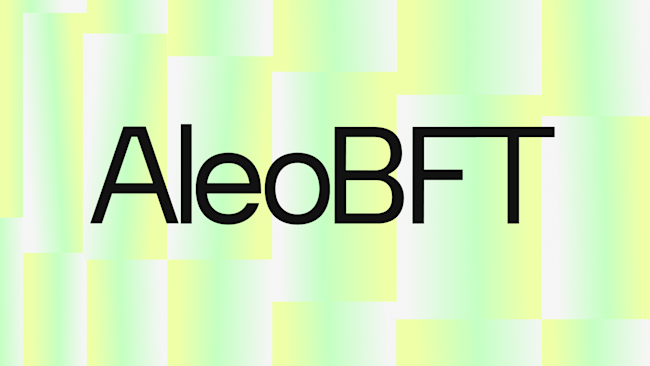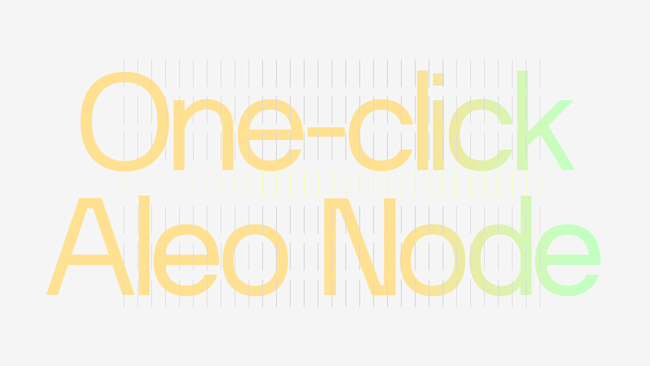Guide to blockchain virtual machines: Comparing AleoVM
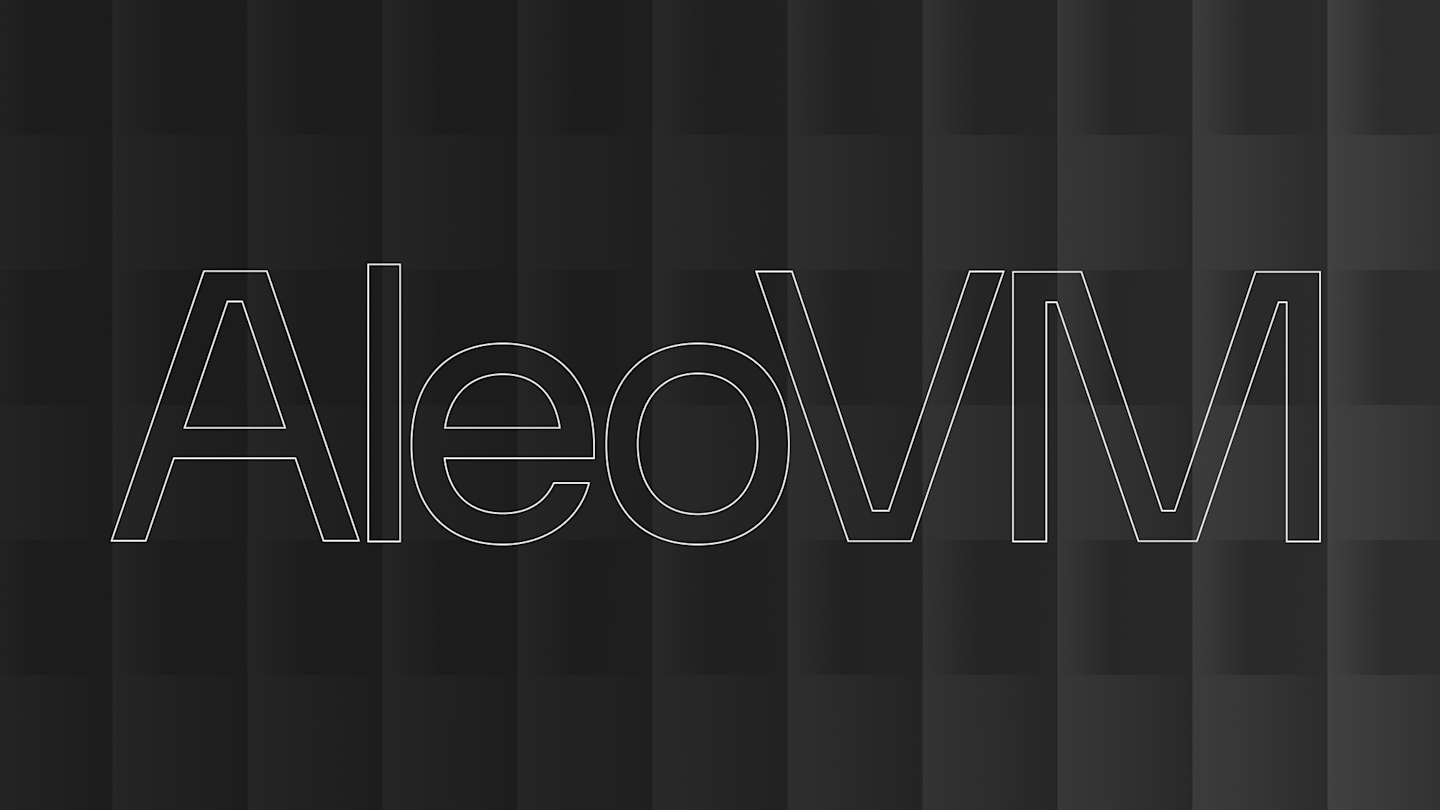
Choosing the right virtual machine is one of the most critical decisions when building decentralized applications, as it determines not only your application's performance and scalability but also fundamental capabilities like privacy and security. While VMs like Ethereum's EVM have enabled groundbreaking innovations, they face inherent limitations around privacy, scalability, and computational efficiency.
We'll examine how AleoVM/snarkOS compares to virtual machines including EVM, zkEVM, zkVM, Solana's SVM, Aztec VM, and MoveVM, analyzing their unique approaches to computation, privacy, and scalability.
What is AleoVM?
AleoVM is the core technology powering Aleo and is designed to execute decentralized applications with built-in privacy guarantees. It enables developers to write general purpose programs that are not only verifiable through cryptographic proofs, but also maintain the confidentiality of their computations. This approach represents a significant shift from traditional VMs by integrating privacy at the very core of its design.
The AleoVM operates on opcodes generated from the Aleo Instruction, an intermediate representation compiled from Leo—a high-level domain-specific language (DSL) for Aleo. Leo abstracts complex cryptographic details, simplifying the process for developers to write smart contracts. Acting as a bridge between high-level developer intent and low-level opcode execution in the AleoVM, Leo streamlines development while ensuring robust functionality. Additionally, developers have the option to work directly with Aleo Instructions, enabling fine-grained circuit design or the development of compilers for languages beyond Leo.
The compiled opcodes are used to construct arithmetic circuits, formalized as a Rank-1 Constraint System (R1CS) in the AleoVM. These circuits are then used to generate succinct, zero-knowledge proofs using a ZK proving system called Varuna, which has improved upon its foundational algorithm, Marlin. This ensures that every computation is verified for correctness without revealing sensitive details, all with improved prover efficiency.
Other than preserving privacy by default, zk-SNARKs significantly enhance scalability by reducing computational overhead. Instead of re-executing an entire computation each time, the AleoVM simply verifies a succinct zero-knowledge proof—a far more efficient process. This streamlined approach empowers the AleoVM to manage more complex operations at a larger scale than traditional systems.
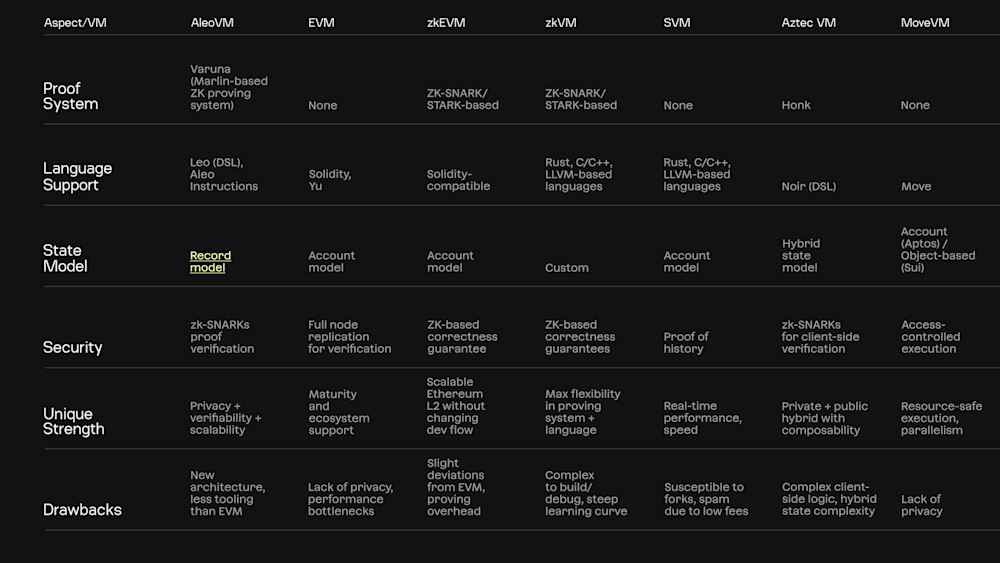
AleoVM Comparison
Ethereum Virtual Machine (EVM)
Inspired by Bitcoin, which demonstrated the power of consensus mechanisms to create a decentralized, global value-transfer system with minimal fees, Ethereum emerged as the first decentralized transaction-based state machine capable of supporting general-purpose smart contracts. EVM is the VM that powers Ethereum, serving as the computational engine for its decentralized platform.
The EVM, while robust and secure, suffers from inherent inefficiencies due to its design that mandates full replication of transaction execution across all nodes to validate every piece of data. Although this redundant verification process enhances security, it also incurs significant computational overhead and creates performance bottlenecks. Furthermore, because validation requires every node to inspect all transaction details, true privacy becomes unattainable, as all data must remain transparent to maintain the system's integrity.
In contrast, AleoVM leverages zero-knowledge proofs to validate computations without the need for full replication. By verifying succinct proofs instead of re-executing entire transactions, AleoVM reduces redundancy and computational load, enabling it to handle more complex operations at a larger scale.This design not only boosts efficiency and enhances scalability but also provides privacy as an extra built-in benefit.
Zero-Knowledge EVM (zkEVM)
zkEVM was developed primarily to address the scalability issues in Ethereum by leveraging zero-knowledge proofs. Rather than executing every transaction on-chain, zkEVM allows transactions to be processed off-chain in a L2 and then verified on-chain via succinct proofs. This approach significantly increases throughput and reduces fees, as transactions are batched and only a single proof is verified on the Ethereum mainnet.
In addition to significantly enhancing scalability, zkEVM seamlessly integrates with Ethereum’s ecosystem. It fully supports Ethereum’s established language (Solidity), development tools, and standards, virtually eliminating any friction for developers building on zkEVM blockchains. However there are subtle differences in terms of equivalency to EVM that need to be aware of. By directly verifying zero-knowledge proofs, zkEVM eliminates the need for prolonged challenge periods required by optimistic rollups, providing instant transaction confirmation.
Compared to AleoVM, zkEVM focuses on scaling the Ethereum network while preserving its established ecosystem and developer experience. AleoVM, on the other hand, is built from the ground up with privacy by default, integrating zero-knowledge proofs to secure and privatize computations. AleoVM can achieve both high scalability and robust privacy simultaneously. Its design allows for innovative applications that require trustless, confidential execution—a capability that extends beyond the scaling focus of zkEVM.
Zero-Knowledge Virtual Machine (zkVM)
zkVMs were developed to overcome the limitations inherent in EVM-based architectures by enabling innovative computation models and advanced cryptographic constructions. Unlike zkEVMs, which inherit certain constraints from the EVM, zkVMs allow for the use of different proof operations and types. This flexibility can lead to reductions in proof sizes, lower generation latency, and decreased computational costs. Their design, often based on an Instruction Set Architecture (ISA) inspired by RISC-V or even custom ISA, enables the use of common programming languages like Rust (or any LLVM-compiled language), further broadening their appeal and accessibility to developers.
However, zkVMs come with their own set of challenges. Their lack of EVM compatibility means they often suffer from a less mature developer toolkit, with limited libraries and experimental resources that can slow down development cycles. Developers are required to learn new programming languages, paradigms, and cryptographic concepts from scratch, which creates significant barriers to adoption. Moreover, debugging and auditing these complex and unique architectures are more challenging and time-consuming, leading to higher audit costs and potential security risks. This complexity can also contribute to ecosystem fragmentation, resulting in isolated liquidity pools and limited user adoption compared to EVM-based solutions.
Unlike zkVMs, which are primarily designed to offer verifiable computations and innovative performance optimizations, AleoVM is explicitly engineered with privacy as its core focus while still emphasizing scalability and a seamless developer experience. Additionally, zkVM technology can be deployed on various networks but does not constitute a standalone blockchain solution. AleoVM, on the other hand, is an integral part of the Aleo blockchain, offering a complete decentralized platform that natively supports robust privacy features along with efficient proof generation. This dedicated blockchain ecosystem provides developers with a comprehensive environment for building next-generation decentralized applications that demand both high performance and strong privacy guarantees.
Solana Virtual Machine (SVM)
SVM is the execution environment for smart contracts and transactions on the Solana blockchain. It was built with the aim for a high performance blockchain to better support real-time decentralized applications, SVM achieves high throughput and drastically reduced transaction costs through unique architecture like Proof of History (PoH) consensus and Sealevel runtime to parallel processing capabilities. This parallel execution model allows for transaction finality within milliseconds to seconds, leveraging modern hardware capabilities to meet the demands of high-speed, low-latency environments.
Solana on-chain programs are compiled using the LLVM compiler infrastructure, enabling developers to write smart contracts in widely adopted programming languages such as C, C++, and Rust. For transaction processing, Solana employs Gulf Stream, a mempool-less transaction forwarding protocol that enhances throughput and efficiency. By knowing the predetermined schedule of upcoming leaders, transactions can be forwarded directly to the expected block producers in advance. This significantly reduces confirmation times, speeds up leader rotation, and minimizes memory overhead on validators by reducing the volume of unconfirmed transactions they need to handle. Additionally, to further ease validator workload, all Solana transactions are set to automatically expire in a certain amount of time.
Similar to most other VMs mentioned, SVM does not provide built-in privacy, as it is primarily optimized for high throughput and rapid transaction finality in real-time finance scenarios. However, this performance-centric design introduces several vulnerabilities. Its ultra-low fees make the network more susceptible to transaction spam and congestion during periods of heavy activity. Additionally, Solana’s rapid block production can lead to inconsistencies across RPC nodes, where desynchronized blockhashes result in dropped transactions. Temporary network forks further compound this issue, as transactions referencing blockhashes from non-canonical or orphaned forks may be invalidated if those forks are abandoned.
In contrast, AleoVM’s proof-based validation decouples correctness from runtime conditions. Since transactions come with verifiable proof, the network doesn’t need to re-run the logic, removing many timing, order, and synchronization dependencies that plague traditional high-speed blockchains. This means AleoVM is inherently more resistant to fork-induced invalidations, network spam, and congestion-based delays, because the cost of generating a valid proof acts as a natural deterrent to abuse, and the network only needs to verify (not execute) the results. As a result, AleoVM achieves greater predictability, stability, and trust in transaction finality.
Aztec VM
The Aztec VM is a core component of Aztec's privacy-first Layer 2 solution on Ethereum. It supports public and private functions, which are executed client-side in the Private Execution Environment (PXE) to maintain confidentiality, and public functions are processed by the AVM on a decentralized network of nodes. This architecture ensures that while private computations remain confidential on the user's device, public computations benefit from the collective security and consensus of the network.
In terms of state management, the Aztec VM interacts with both private and public states. Private state utilizes a UTXO model, where data, referred to as notes, are stored in an append-only UTXO tree, ensuring privacy through encryption and zero-knowledge proofs. Conversely, a public state operates akin to traditional blockchains like Ethereum, maintaining transparency and accessibility by storing data in a public data tree. This dual-state model allows developers to create versatile smart contracts that can securely manage both confidential and transparent data within the same framework.
Both the Aztec VM and the AleoVM are designed to facilitate private computations using zero-knowledge proofs, ensuring transaction data remains confidential and verifiable. However, they differ in architecture and implementation. Aztec operates as a Layer 2 solution on Ethereum, integrating public and private execution within a single zkRollup, allowing for seamless composability across encrypted and unencrypted transactions. Conversely, Aleo is building a standalone Layer 1 blockchain optimized for zero-knowledge cryptography, enabling off-chain execution with on-chain verification through decentralized private computation (DPC). This approach allows Aleo to tailor its infrastructure specifically for privacy-preserving applications, independent of existing blockchain constraints.
MoveVM
The MoveVM is the execution environment for the Move programming language. MoveVM emphasizes resource scarcity and access control, ensuring that assets cannot be accidentally duplicated or destroyed, and that only authorized modules can access or modify specific resources.
While both Aptos and Sui blockchains implement the MoveVM, they diverge in their architectural approaches. Aptos employs a traditional address-centric design, similar to Ethereum, where the global state is organized around accounts. It leverages Block-STM, an optimistic parallel execution engine that speculatively executes transactions in parallel and re-executes only those that conflict, thereby enhancing throughput. In contrast, Sui introduces an object-centric model, treating data as independent objects with unique identifiers, allowing for natural parallel execution of unrelated transactions.
MoveVM, as implemented in Aptos and Sui, is designed for performance and correctness, prioritizing secure asset management and parallel transaction execution to maximize throughput. In contrast, AleoVM is built from the ground up for privacy, leveraging zero-knowledge proofs to enable fully private and verifiable off-chain computations. Unlike AleoVM, there is no built-in privacy in MoveVM — all data and state changes are publicly visible on-chain, which limits its suitability for use cases that require strong confidentiality.
Benchmarks
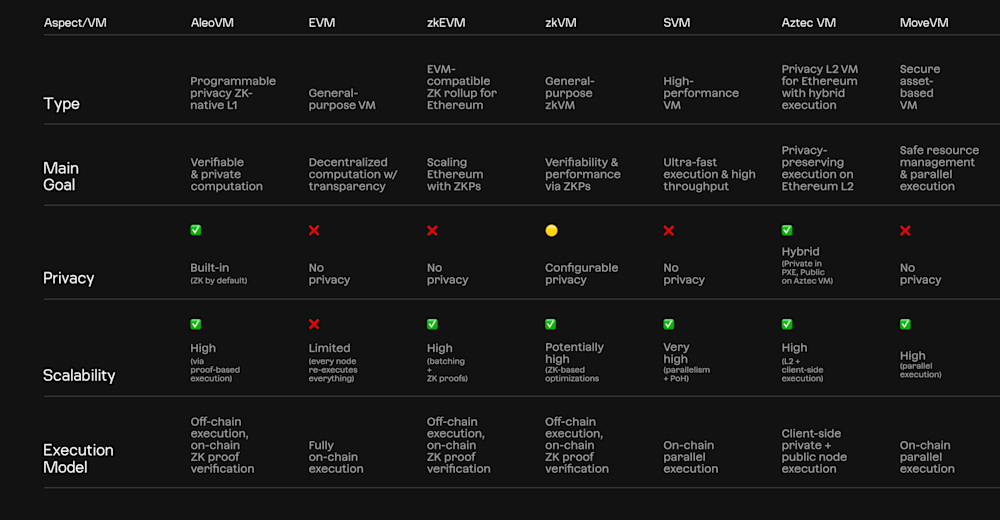
Conclusion
AleoVM stands out as a groundbreaking virtual machine purpose-built for privacy-preserving, scalable, and verifiable decentralized applications. With native support for zero-knowledge technology, it enables computations to be both confidential and provably correct without requiring re-execution—delivering built-in privacy that other VMs often achieve only through additional layers or complex integrations. With the help of the Leo language, it abstracts away cryptographic complexity, developers can build sophisticated, trustless applications more easily and efficiently.
That said, as a relatively new architecture, AleoVM still faces challenges around tooling, documentation, and overall developer experience. However, the ecosystem is actively investing in improving these areas—streamlining workflows, expanding SDK support, and fostering community-driven resources to make building on Aleo increasingly accessible and efficient.
